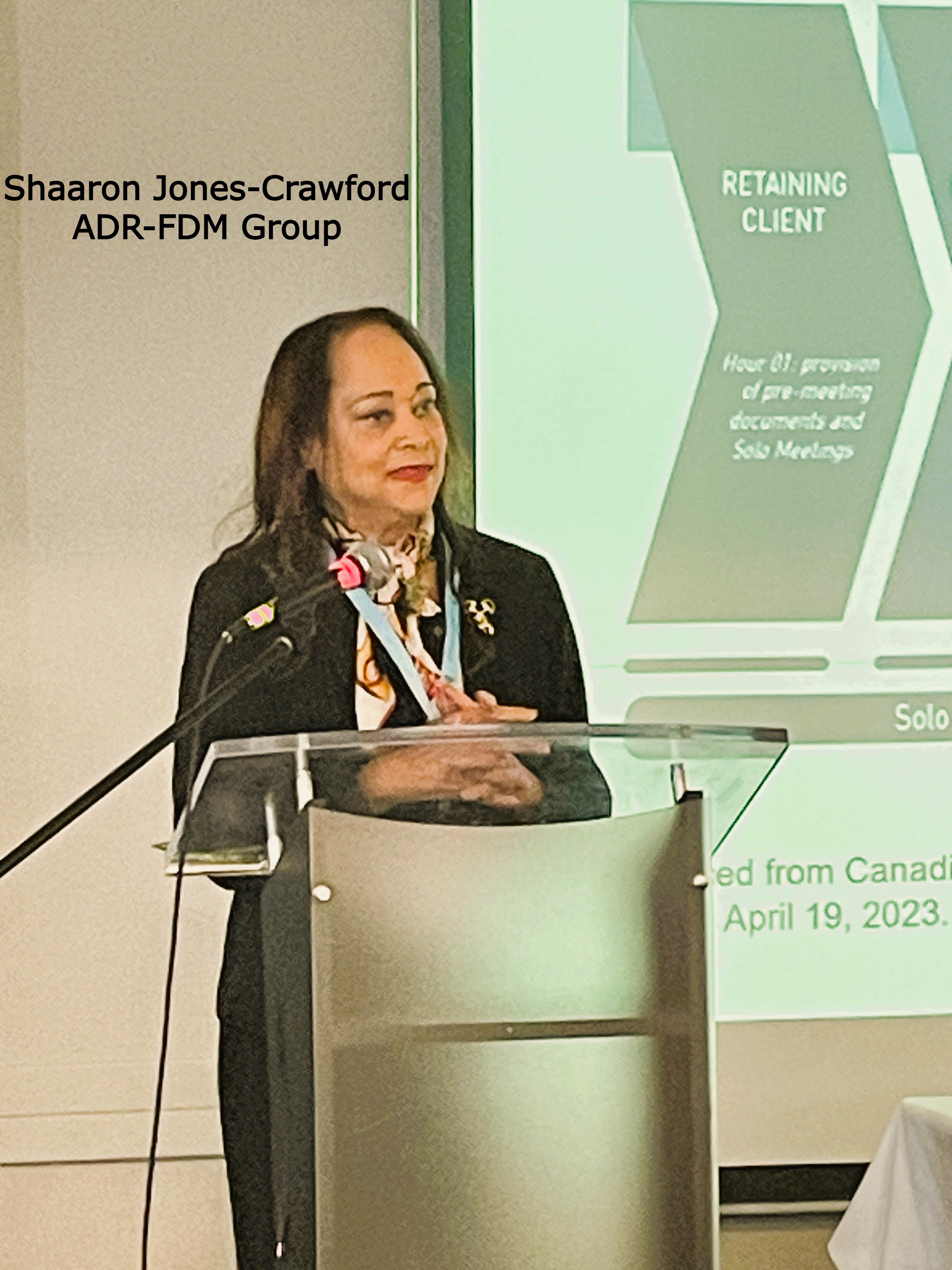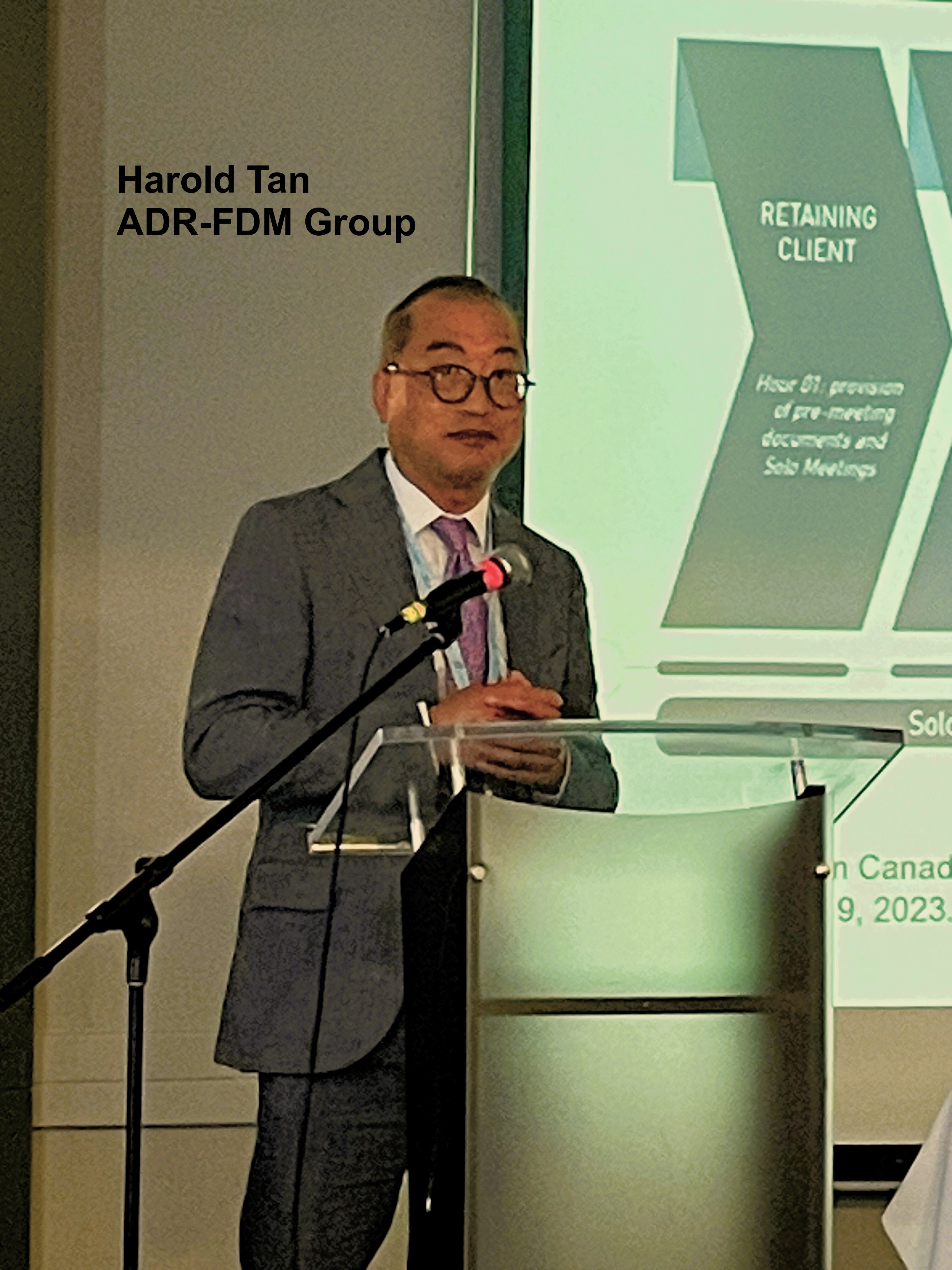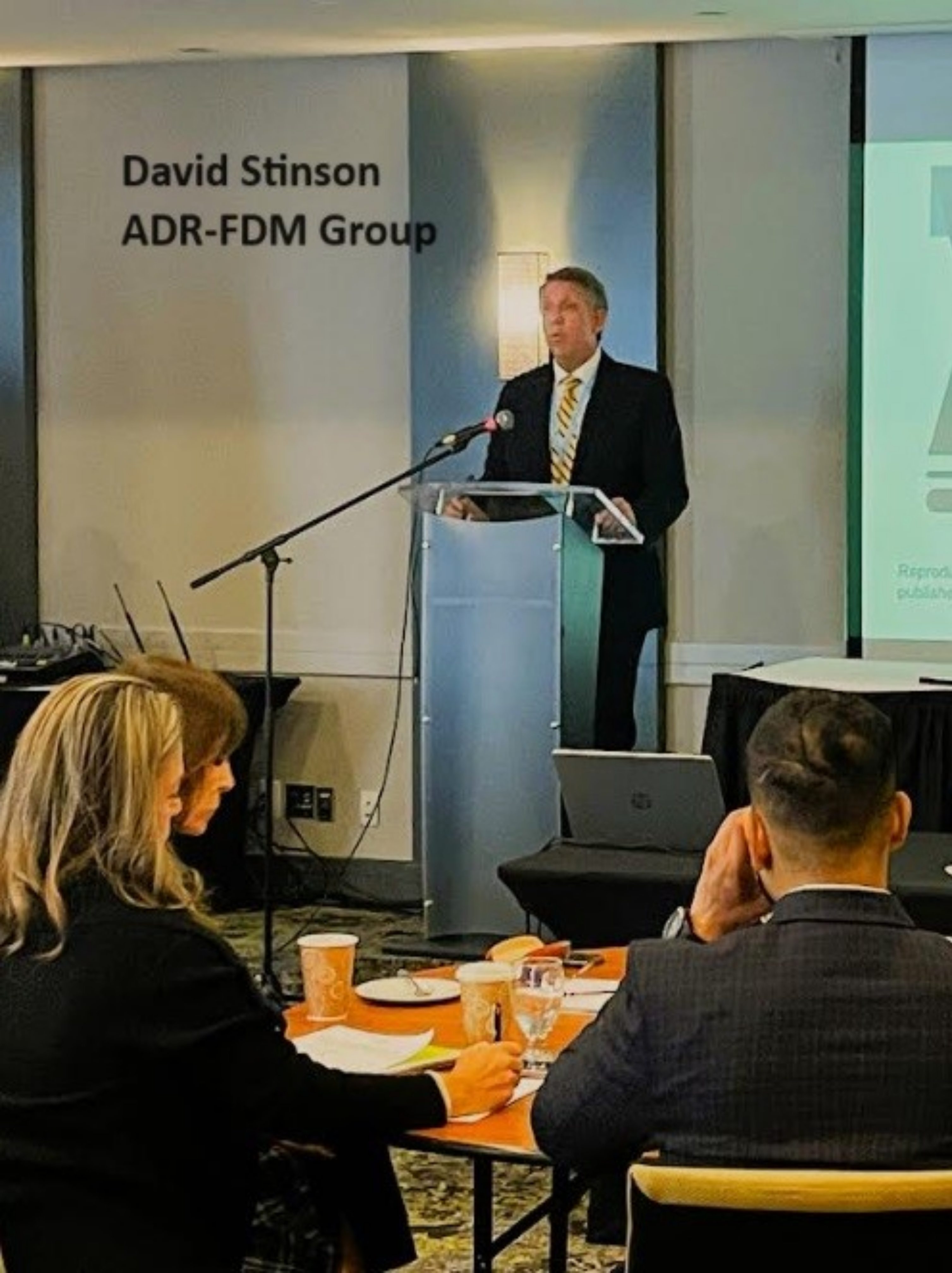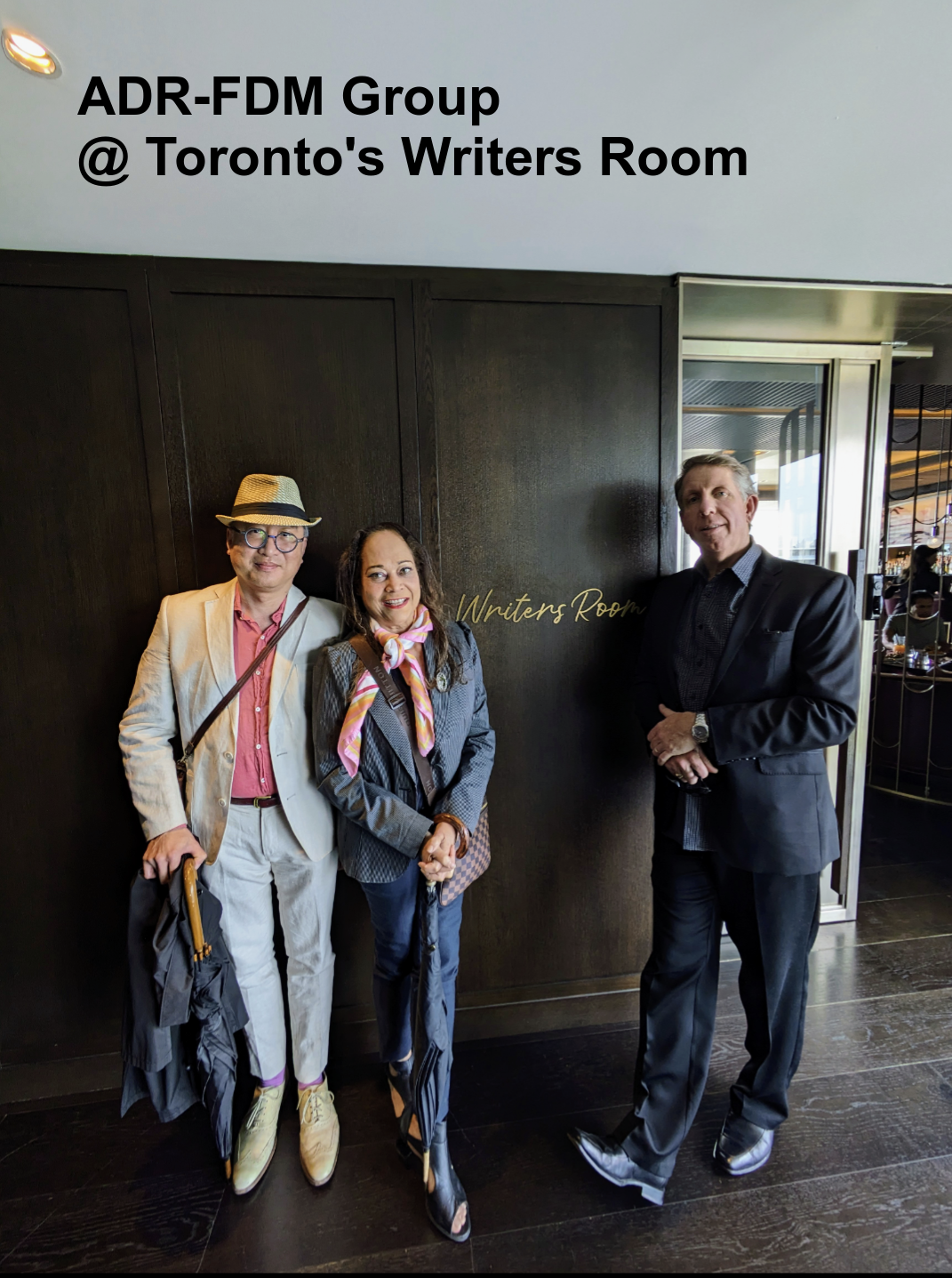



‘In the midst of chaos, there is also opportunity’
– Sun Tzu (The Art of War)
CAMJ (Spring 2023) – Facilitated Dialogue Model: A Rebel in ADR?
About FDM
What is Facilitated Dialogue Model (FDM)?
Facilitated Dialogue Model (FDM) is a directive, fast-paced, time-efficient Model for a neutral Facilitator to conduct Direct Dialogue between clients in conflict. FDM requires:
- A Retaining Client who is progressive, dynamic, prepared to take some risk by using FDM, and assume responsibility for vetting Stakeholders
- A Facilitator who is experienced, intuitive, observant, analytical and skilled
- The Stakeholders who are articulate, diligent, committed, collaborative and are able to engage in a Direct Dialogue with each other
FDM is akin to a Grand Prix: the driver and pit crew work in synchronized tandem, and time their actions to the second. From start to finish, FDM is structured to take no more than 5.0 hours. The entire FDM process can be completed within a five-day business week. In the Grand Prix, everyone on the track is subject to specific rules that are designed to facilitate speed, involve highly skilled participants, and the goal is a single winner outcome. FDM has all of these, except for one key difference: both Stakeholders are winners because they share the chequered flag.
Where FDM can be applied?
FDM can be applied to a variety of sectors, including Commercial, Private, Public and Civil Society. Examples include: Law & Justice, Civil and Educational Institutions, Governance and Boards, Construction & Trade, Sports, Regulatory Bodies, Self-Employed Professionals, Science & Technology, Arts & Media, et al. FDM was designed specifically for matters that are 1.5 years or less. The FDM designers precluded historical relationships, as it focuses on immediacy, today. In our conceptualization, FDM is not appropriate for entrenched interpersonal conflicts, family and estate, et al. Conflicts over 1.5 years are too entrenched and complex, and would be better suited for other ADR processes.
FDM Delivery
We offer the following Services:
- Book an FDM Facilitator
- FDM Facilitator training (General and Customized)
- Customized Coaching (One-on-One)
- Book a Webinar
FDM is available in-building, virtually, and internationally. FDM can be customized for a specific client or situation.
Confidentiality
In FDM, all documents, conversations and communications with the FDM Facilitator, FDM Retaining Client, and FDM Stakeholders are confidential. The privacy and trust of all parties and the organization is maintained at all times. All information is privileged, and no written record is retained at the conclusion of the file. This includes any potential written Agreement made by Stakeholders.
Who should be booking the ADR-FDM Group for Direct Service
This list is not exhaustive.
- Civil, Commercial and Corporate lawyers
- Insurance Companies
- Professional Associations
- Chief Executive Officer
- Banking and Financial Institutions
- Senior Directors, Managers and Boards from both Public and Private sectors
- Human Resources Managers
- Union Leaders
- Chief Financial Officer
- Team Leaders, including Sports, Manufacturing, Medical and Technology
- Self-employed Professionals
Exemptions and Exclusion
When an organizational or institutional leader becomes aware (or is brought to their attention) that there is a disruption, inefficiency or non-delivery of tasks and deadlines by their staff, unit or team, the leader now has the option to offer FDM as a means to expeditiously address this disruption. Conversely, the ADR-FDM Group did not design FDM for entrenched, enduring conflicts and disputes over 1.5 years in duration. FDM is not suited for Criminal matters and Restorative Justice. Further, FDM is not suited for some Civil and Commercial areas, such as Succession, Probate, Wills, Family and Defamation, et al.
FDM Qualities and Characteristics
The following are parties in the FDM process. For the authors, these are the qualities and characteristic they suggest for the optimal, most efficient functioning of FDM:
Qualities required for FDM Facilitator
The FDM Facilitator has to be confident, highly skilled and experienced. Because of time constraints and the expediency of this process, the FDM Facilitator must be able to establish rapport and trust quickly, and be confident in managing timelines rigorously. The FDM Facilitator has the autonomy to create an Agenda that represent both Stakeholders’ positions. As such, advanced analytical and objectivity skills are required.
Qualities required for FDM Retaining Client
The FDM Retaining Client must be able to recognizing emerging conflicts that have not hardened to the point where other processes are required. This requires the confidence and objectivity of a senior leader who understands the importance of early, pro-active intervention and is able to analyze a situation critically and objectively. Because FDM is best suited for conflicts less than 1.5 years in duration, the FDM Retaining Client is progressive and dynamic in their ability to recognize difficulties when they arise, seize the opportunity for early resolution and assume responsibility for vetting the Stakeholders who will be participating in this process.
Qualities required for FDM Stakeholder
The FDM Stakeholder must possess integrity and be willing to forthrightly participate in this process. The FDM Stakeholder is required to acknowledge their role, and be confident in identifying and articulating their position. These are the attributes required for the FMD Stakeholder to complete their confidential, customized Questionnaire, as their responses form the FDM Agenda
The ADR Practitioner
The cornerstone qualities of an ADR Practitioner are universally well-established, and include Neutrality, Independence, Transparency and strong communication skills.
To be an effective FDM Facilitator, additional skills are required. This applies to both ADR Practitioners and non-ADR professionals who have been specifically trained in FDM. Some of these additional qualities include strong analytical skills, confidence, advance negotiation and effective management of people and time.
ADR-FDM Group
We are the ADR-FDM Group. The ADR-FDM Group is composed of professionals with backgrounds in Law, Alternative Dispute Resolution, Conflict Coaching, Investigations, Negotiation, Board Governance and Training.
FDM Services
Book an FDM Facilitator
The ADR-FDM Group is available to provide professional service for your organization. The benefits of retaining an external FDM Facilitator include:
- Specialized expertise which may not be available internally
- An independent professional who will maintain confidentiality
- Swift and expeditious resolution of a disruption which preserves the integrity and reputation of your institution
The FDM Facilitator is available in-building, virtually and internationally.
FDM Facilitator Training (General and Customized)
The ADR-FDM Group offers training to become an FDM Facilitator. FDM Facilitator training is available in-building, virtually and internationally. General FDM Facilitator training is available at regular intervals throughout the year (dates to follow), and can also be customized for a client. This training is available to experienced ADR Practitioners to enhance and expand their professional skills. FDM Facilitator training is also available to non-ADR professionals who may wish to expand their professional skill set. Here is a suggested list of who may benefit from attending the FDM Facilitator Training:
- Lawyers
- Mediators
- ADR Practitioners
- Online Dispute Resolution (ODR) Practitioners
- Arbitrators
- Organizations that use ADR services
- Dispute Resolution Trainers
- Government and Municipal Agencies
- In-house Counsel
- Financial and Banking Institutions
- Managers
- Med/Arb Practitioners
- Workplace Investigators
- Negotiators
- Executive Leaders
- Labour Relations
- Conflict Coaches
- Insurance Institutions
- Members of Boards
- Facilitators
- Ombudspersons
- Human Resources Specialists
- Parenting Coordinators

Customized Coaching (One-on-One)
- Retaining Client identifies and selects a Stakeholder for One-on-One Customized Coaching to improve/enhance their communication skills. The Retaining Client may elect to select multiple Stakeholders for One-on-One Customized Coaching
- Participants who have taken the FDM Facilitator training and seek further skills enhancement (eg. Building the Agenda, Direct Dialogue, Expansive Collaboration, et al).
- Stakeholders who have been involved in the FDM process, and wish to further develop their skills (eg. Creating a Customized Questionnaire, Running a Joint Session, Reframing a Direct Dialogue, et al.)
One-on-One Customized Coaching is available in-building, virtually and internationally.
Book a Webinar
The ADR-FDM Group can deliver a webinar, lecture or presentation on a pre-determined topic. The topic can be delivered in-building, virtually or internationally.
Other ADR Services
Mediation
Neutral, third-party (Mediator) works with parties to communicate directly to each other with the aim of resolving their concerns.
Investigation
The ADR-FDM Group offers two types of Investigations.
Probative: Typically arises where individual(s) have been alleged to breach policy, and the Investigator arrives at a finding of fact.
Non-probative: Non-probative. The Investigator designs the process where the parties engage anonymously. Individuals are not named, and the Investigator seeks to identify broader themes typically related to systems, structures, organizational culture and communication. Applicable for situations where the workplace has experienced ongoing, serious disruption and are seeking ways to move forward.
Preliminary Inquiry
A disruption has occurred, and the client is not sure what is happening. A Preliminary Inquiry provides an exploration/discovery of the underlying issues and what needs to be remediated/addressed.
Facilitation
A neutral, third-party (Facilitator) creates a process that aids participants to communicate more effectively and move towards their goals more efficiently. Appropriate for Boards, teams and groups with divergent interests.
Negotiation
A neutral, third-party (Negotiator) assesses and inquiries what parties with opposing positions want, and provides a bridge for the exchange of information between them. The Negotiator guides the parties in identifying options and limitations, and creates the space for the widest possible outcomes to be explored.
Arbitration
A private process where the clients hire an Arbitrator to make a binding decision based on law. Arbitration is a more efficient and expedient alternative to litigation. The clients and their counsel have pre-agreed that the Arbitrator’s decision will be binding, and there is a jurisdictional base to the decision.
Evaluative Neutral
Should parties experience an ongoing impasse or deadlock in an active file, they may retain the services of an Evaluative Neutral to parachute in and provide a “bird’s eye” perspective of the situation. The Evaluative Neutral may identify potential gaps and opportunities for remedy. This concludes their role in the file.
Multi-party Cases
Customized design for complex cases involving numerous parties where a single process may not be appropriate for all of the identified issues.
Customized Coaching
One-on-one identification and enhancement of communication skills, particularly designed to assist in effective management, leadership and mentoring.

Gallery and Events
- ADR Institute of Ontario – “Incarceration to Atonement” Live Webinar (2026)
- Arbitration and Mediation Court of the Caribbean – “Facilitated Dialogue Model” Live Webinar (2024)
- ADR Institute of Ontario – “Facilitated Dialogue Model” Live Webinar (2024)
- Barbados Supreme Court Mediation Roster – “Preliminary Inquiry” Live Webinar (2024)
- ADR Institute of Canada – Preliminary Inquiry” Presentation, National Conference (2024)
- Chartered Institute of Arbitrators (CiARB), Caribbean – “Facilitated Dialogue Model and Preliminary Inquiry” Presentation, Conference (2024)
Publications
Facilitated Dialogue Model Publications
Restorative Justice Publications
ADR Publications
Biographies
SHAARON JONES–CRAWFORD
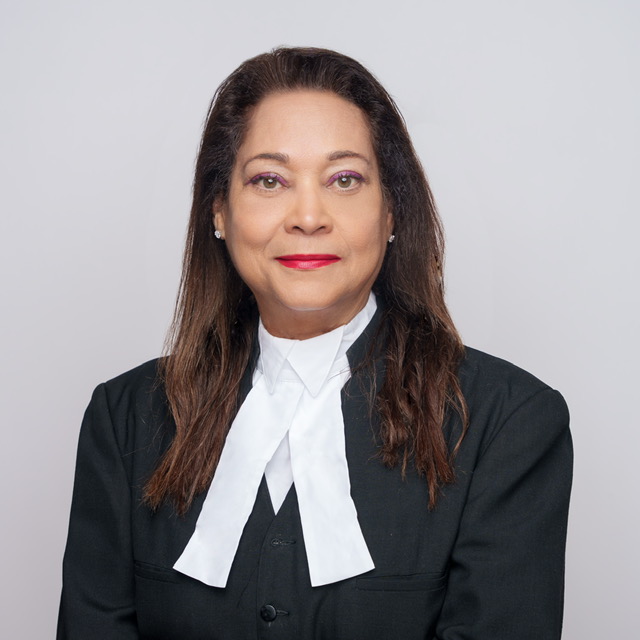
Shaaron Jones-Crawford is an internationally trained Barrister with experience in Mediation, Arbitration and Alternative Dispute Resolution and Training. She has been a Trainer in organizations such as Osgoode Hall Law School, Ontario Ministry of the Attorney General, Ontario municipalities (Toronto, Hamilton, etc.), Toronto By-Law Enforcement and Toronto Police.
She holds an LL.B and LL.M., called to the Bar of England and Wales and is a member of The Honorable Society of Lincoln’s Inn in London, England. Shaaron is a member of the Alternative Dispute Resolution Institute of Ontario/Canada (ADRIO/ADRIC) and holds a Chartered Mediator (C.Med.) designation.
Shaaron holds an Executive Certificate of Conflict Management (EC.CM) from Windsor Law School, and is a Chartered Community Mediator (CC.Med.) from the Ontario Community Mediation Coalition. She also holds a Certificate in Adjudication for Administrative Agencies, Boards and Tribunals (Osgoode Law School).
Shaaron holds an Advanced Certificate in Peacemaking Circles from University of Waterloo, and is trained in Restorative Justice (Ontario Ministry of the Attorney General).
Additionally, Shaaron is a licensed Attorney-at-Law in the Caribbean, with access to multiple Caribbean jurisdictions. Shaaron practices predominately in corporate/commercial and has worked in areas such as banking, government, not-for-profit, law enforcement, media and insurance.
Shaaron has authored and published in ADR Journals, including the Canadian Arbitration and Mediation Journal
HAROLD TAN

Harold Tan is a Mediator, Investigator, Adjudicator, Trainer, Humber College (Longo School of Business) faculty, Author, and Coach. He holds a LLM (Alternative Dispute Resolution) from Osgoode Law School, a Qualified Mediator (Q. Med.) designation with the ADR Institute of Ontario/Canada, and a Chartered Community Mediator (CC. Med.) designation with the Ontario Community Mediation Coalition.
He holds a Certificate in Peacemaking Circles – Advance from Conrad Grebel College (University of Waterloo), and is trained in Restorative Justice (Ontario Ministry of the Attorney General). Additionally, he holds a Certificate in Adjudication for Administrative Agencies, Boards and Tribunals (Osgoode Law).
He is a Coach in the York University Dispute Resolution Program, and the ADRIC National Introductory Mediation Course. Additionally, Harold is a Partner in the adr-fdm group (adr-fdm.com), a specialized ADR service which offers Facilitated Dialogue Model and other ADR services.
Harold’s practice includes working with administrative Boards on effective governance, strategic planning, stakeholder engagement, and chairing meetings.
Harold has published in ADR Journals, including the Canadian Arbitration and Mediation Journal.
LinkedIn: www.linkedin.com/in/harold-c-tan
Copyright © 2026 ADR-FDM Group. All rights reserved.
Design, development & hosting by Logical Business Solutions Inc.

